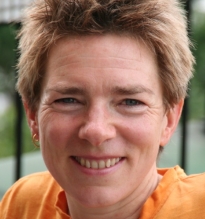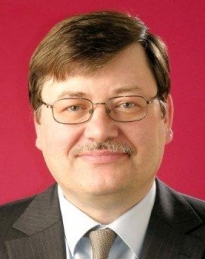Imperial ranked in world top three for materials science, thanks to plastic electronics researchers

Imperial's Centre for Plastic Electronics is home to four of the world's top 100 materials scientists - News
Monday 28 February 2011
By Simon Levey
Imperial is one of the top three institutions in the world for materials science research, according to a global review of the most prominent researchers in the field.
See also:
- Thomson Reuters Essential Science Indicators
- Times Higher Education
- 2011 International Year of Chemistry
- Download the full materials science ranking (PDF via external site)
- Massachusetts Institute of Technology (MIT)
- University of California Santa Barbara (UCSB)
Related news stories:
The review lists the 100 researchers who achieved the highest citation impact scores for research papers published since January 2000. With four entries in the list, and half of all UK entries, Imperial as an institution is ranked joint 2nd in the world with Massachusetts Institute of Technology (MIT). The University of California Santa Barbara (UCSB) is top of the list, with five entries.
The list has been compiled by publishing giant Thomson Reuters in celebration of the 2011 International Year of Chemistry and was reported in Times Higher Education on 24 February 2011.
Scientists from the Centre for Plastic Electronics at Imperial are the 1st, 2nd, 4th and 6th most prominent materials scientists in the UK, according to the scale.
Plastic electronics is a rapidly growing field of research with the potential to bring significant developments in energy, environment and healthcare. Imperial's scientists are working across physics, chemistry and materials science on areas including realistic solutions for solar power generation, new, low-energy computer displays, solid-state lighting, pervasive electronics, imaging and sensing arrays, and photonics.
"I would like to congratulate our four colleagues whose research has been celebrated in this influential listing," said Professor Maggie Dallman, Principal of Imperial's Faculty of Natural Sciences, which hosts the Centre for Plastic Electronics along with partners in the Faculty of Engineering. "Plastic electronics and materials science are areas where Imperial truly excels, and this is an outstanding recognition of some of our interdisciplinary and cross-Faculty science.
"Our success is thanks in no small part to the truly unique research environment, and our researchers' expertise spanning the breadth and depth of basic science and transferable knowledge. There is also no doubt that the EPSRC-funded Doctoral Training Centre for research in plastic electronics acts as an important focus for research activity as well as enhancing the experience of our young researchers and students," she added.

Professor Jenny Nelson
Thomson-Reuters is ranking the most influential chemists, biochemists and materials science experts in the world using an 'impact' score that has been derived to identify consistently superior performance and reflect a level of influence in the field. The average citation impact in materials science for the period was 6.93 and all the researchers listed achieved more than six times that mark, representing the top fiftieth of one percent of over half a million eligible scientists.
The following materials scientists from Imperial were ranked by Thomson-Reuters this week:
Professor Jenny Nelson, from the Department of Physics' Experimental Solid State Physics group at Imperial, is 1st in the UK list and 32nd globally. Her research focuses on designing affordable and low carbon routes to future power generation, using energy from sunlight, and finding the ideal materials to make the technology widely available.

Professor Iain McCulloch
On hearing the news, Professor Nelson said: "I was astonished to find my name in the list, but I think it shows how important the challenge of developing solar energy materials has become. The field is attracting excellent young scientists, because it combines a strong social motivation with exciting scientific challenges, and their contribution has helped to put us on this list. This recognition gives me renewed enthusiasm to work towards our goals."
Professor Iain McCulloch is 2nd in the UK and 35th on the global list. He is a polymer chemist based in the Nanostructured Materials and Devices group in the Department of Chemistry. He is co-inventor on over 50 patent families filed from his research, which is in the development of high performance organic semiconductor materials, which are the technological basis for a new generation of low-cost electronics and solar cells.
Professor McCulloch looked back at the research environment that helped this success, saying: "There are many co-authors on all my papers that are included in generating this list, so my position reflects the excellent colleagues and collaborators with whom I am fortunate to work."

Professor James Durrant
Professor James Durrant is Professor of Photochemistry in the Department of Chemistry, as well as Co-director of the Centre for Plastic Electronics, Deputy Director of Imperial's Energy Futures Lab and co-ordinator of the Imperial Solar Network. He features as 4th most influential materials scientist in the UK and 41st in the world. His research looks at the development of new chemical approaches to solar energy conversion – harnessing solar energy either to produce electricity with photovoltaics or molecular fuels such as hydrogen.
Professor Durrant expressed surprise at his inclusion, having never considered himself a materials scientist. He said: "The list emphasises the interdisciplinary nature of materials science - where physicists, chemists and materials scientists are working together to develop new materials for key technology challenges such as plastic electronics and low cost solar energy conversion."

Professor Donal Bradley
Professor Donal Bradley CBE, FRS is 6th in the UK list and 79th globally, ranked by citations per paper, rising to 2nd in the UK and 34th in the world on total number of citations. He is the Lee-Lucas Professor of Experimental Physics and Director of the Centre for Plastic Electronics. Professor Bradley's research focuses on the physics and application of plastic electronic materials and devices, spanning light emitting diodes for displays and lighting, transistors for electronics and sensing, photodiodes for solar energy generation and photodetection and optical gain structures for data communications. He is a co-inventor of conjugated polymer electroluminescence, co-founder of Cambridge Display Technology Ltd, co-founder and Director of Molecular Vision Ltd, member of C-Change (UK) LLP and Director of Solar Press Ltd with more than twenty patent families to his name.
Professor Bradley commented: "I am delighted to see the Centre for Plastic Electronics featuring so strongly in this list; the decade-long development of an integrated plastic electronics programme at Imperial is really bearing fruit. Our challenge now is to maintain and enhance the Centre's capabilities so that our future research will be equally prominent."
Article text (excluding photos or graphics) © Imperial College London.
Photos and graphics subject to third party copyright used with permission or © Imperial College London.
Reporter
Press Office
Communications and Public Affairs
- Email: press.office@imperial.ac.uk
